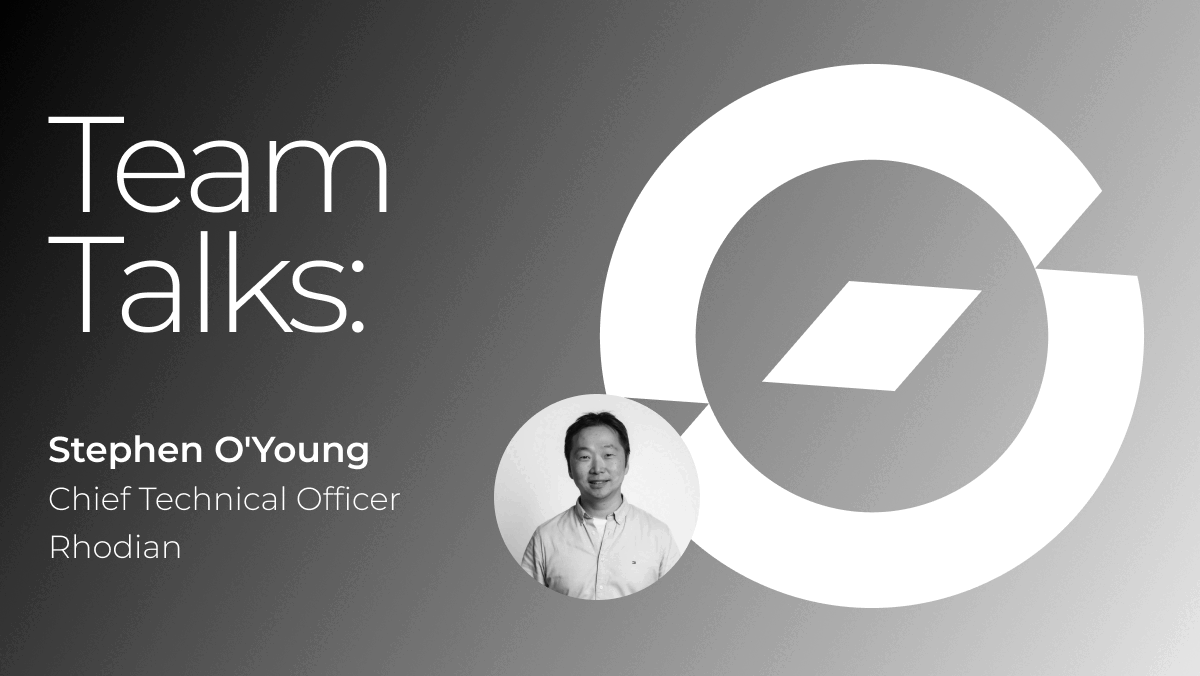What is your role at Rhodian?
I’m Rhodian’s CTO. I serve as the bridge between business and tech and am responsible for defining the role technology plays in Rhodian’s vision. It is so easy to be mesmerized by the shiniest tech du jour that I see a large part of my job is in identifying the right tools to carry us to our goal without being distracted. Despite being a technology fanboy, I’ve been around the block enough to know that technology is not the panacea to every problem. My balancing of tech and business perspectives is something I’m proud of.
What did you do before your journey with Rhodian began?
I studied Computer Engineering at Uni and had a career in software development and solution architecture. I started in tech consulting but landed in the insurance industry, where I developed and architected policy systems for large insurers. In the early 2010’s I left corporate life to found my own startup, a digital platform that enabled parents to share their children’s photos with close family and friends. The service was loved by millions of users all over the world and we eventually listed the company on the ASX. I exited the business in 2020 and was searching for my “next big thing” when I was introduced to Simon and Tess about Rhodian. I never expected to get back into the insurance space after all these years but thought this was a good opportunity to utilize the experience I’ve gained in both my insurance and startup lives.
What excites you about the future of our industry?
We’re beyond just using technology to improve existing insurance practices (eg. Automation, personalization, distribution, etc.). Instead, I’m looking forward to how insurance will adapt to advances in technology. For example, as more and more of the world is run by software (and increasingly AI) how will insurance help to manage the risk of cyber-attacks and software bugs? If an electric vehicle crashes due to a flaw in its driving AI model who’s at fault? How will premium models change when IOT sensors can report changes in risk in real-time? Will insurers move from management of risk to prevention of risk even more? Will insurers even exist anymore when everybody can be an insurer in a P2P landscape?
What inspires you / do you love about working in the technology space?
Ever since I was young, I’ve always wanted to be an inventor. I have the utmost admiration for scientists as they’re the ones that seek to understand how the universe works. Science is truly the force that transforms humanity. Alas, I’m not smart enough to be a scientist so I settle for finding joy in applying their science to solve real-life problems. I love building things and solving problems. Finding a simple solution to a difficult problem gives me a lot of pride.
What do you feel are the key differences between working in a startup/incubator type environment compared to the corporate world?
How decisions are made is very different. In the corporate machine, every decision needs to be routed through numerous stakeholders – all of whom fear making the wrong decision and endangering the current business. In a startup, there IS no current business, so the goal is simply to find the Right Thing as soon as possible, even if that means risking doing the wrong thing many times first. Inaction is often worse than the wrong action in a startup. Having said that, since a startup has much fewer resources than a corporate it must be super efficient so that even if you make the wrong decision, you can recover and try something else. How you pick your team, prioritize your initiatives, and manage your cash flow are all critical in achieving this efficiency and ultimately determine how your business is run.
What role do you think technology can play in helping to create underwriting agencies that have real differentiators?
Clever use of technology can remove the many obstacles in the way of creating a new agency. No longer bogged down, the agency can better allocate its resources to understanding its customers’ needs and creating innovative products that better meet these needs. The ability to release a new insurance product in weeks and months instead of months and years enables fast-moving agencies to iterate and learn quickly. Furthermore, agencies now have access to vast amounts of internal (eg. Customer, policy and transactional data, etc.) and external data (eg. 3rd party data, sensor data, scraped data, etc.). This data enables them to better understand and manage risks, opening the door to innovative underwriting and rating rules.




